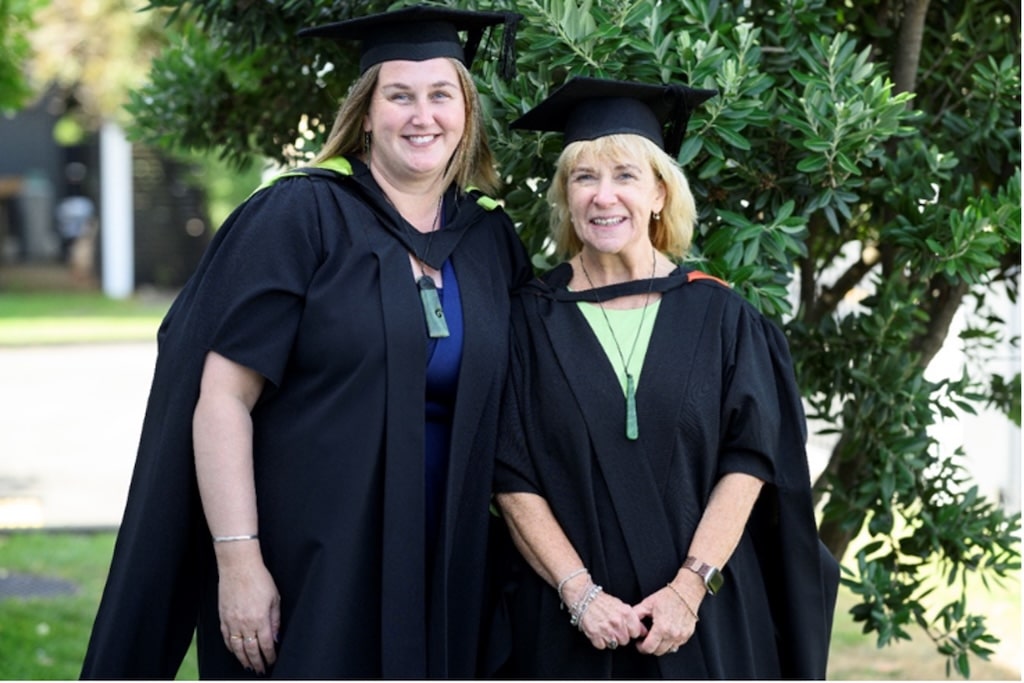LEADING LIGHTS Issue 1 | 2025

Jo Ellis
Organisation
Te Rito Maioha Early Childhood New Zealand
Title
Regional Education Leader | Kaiārahi Matauranga ā-Rohe, Lecturer | Kaiako

Rachel Taylor
Organisation
Te Rito Maioha Early Childhood New Zealand
Title
Lead, Quality of Teaching Practice | Kaiārahi Kaimātai Rauemi Ako
Lecturers Jo Ellis and Rachel Taylor from the Ōtepoti Regional Education Centre of Te Rito Māioha (Early Childhood New Zealand) aimed to understand the experiences of centre leaders during the COVID-19 pandemic and its impact on them. The study focused on exploring the perspectives and experiences of these leaders in relation to the pandemic.
This summary of the research outlines the challenges faced by leaders and how these challenges influenced their roles. It also describes the strategies centre leaders implemented to support their wellbeing and maintain effective leadership. The narratives shared by the leaders aimed to provide support and inspiration to other leaders who may have encountered similar issues during this challenging period.
The COVID-19 pandemic has been described as an unprecedented event in modern history (United Nations, 2020) with significant impacts and ongoing challenges being felt nationally and globally. The uncertainty that came with the pandemic meant that leaders from across different organisations had to adapt their leadership practices to be more task-oriented and responsive to the ever-changing landscape.
The event significantly affected leaders in the educational sector, particularly those in early childhood education. It caused considerable disruption and change, forcing these leaders to navigate complex and rapid transformations. As a result, many experienced feelings of disequilibrium and discomfort, which required them to find clarity in their roles during this uncertain period (Junça-Silva & Caetano, 2024).
The focus group included four centre leaders who were asked questions based on data from an online survey that informed the discussion. Our research questions aimed to understand how these leaders navigated the challenges they faced and how this impacted their well-being and effectiveness as leaders.
Research questions
- What examples can you share with us to support your experiences during COVID-19?
- What have your challenges been during the pandemic?
- What are the continued challenges?
- What are you doing to support your wellbeing?
Impact on leaders’ well-being:
Focus group participants stressed that during the COVID-19 pandemic, their time, work, and energy were primarily consumed by the needs of their staff, tamariki, whānau, and operational matters. This, in turn, impacted their wellbeing. leaders described feeling scared, vulnerable, nervous, and very concerned about what would happen if they got sick. For example, “Who's going to do the work? Pay the staff?”
It was evident from the focus group that the leaders were in a ‘reaction’ mode of operating during the pandemic, and as a result, they did not stop to think about how they could spread their workload. One leader outlined the constant “worry about not keeping up with the information” and feeling they needed to “be available for all stakeholders all the time.” Adding to this, “it was so intense and there was no downtime.” The vulnerability of the leaders was apparent as they shared their stories, and it became evident during the focus group that their wellbeing was not a priority for them.
When the focus group were asked about how they supported their wellbeing, their responses were very honest and their vulnerability as leaders became obvious. One leader responded with “nothing, but I knew I needed to but there was no time”. This powerful response demonstrates their fragility and sense of despair regarding the situation they were in. Leaders also commented they did ‘nothing’ to support their wellbeing and “the second day of lockdown was the first time I got a full night’s sleep. I was so stressed, I felt protected in my house, being at home, we knew we’d be okay”.
One leader explained that during this time, they planned how they would exit the ECE sector altogether. “I got my exit strategy underway; it took everything out of me”. These findings align with Fullan (2020), who contends that change creates disequilibrium, which can be uncomfortable. Therefore, people must make sense of the process for themselves (Fullan, 2020).
Challenges of leading during COVID-19
“My brain feels like a browser with 100 tabs open” (Kim et al., 2022, p.309)
- The volume of ever-evolving information
- Lack of support to manage and solve problems
- Staffing issues
- The leaders felt relentless pressure from staff, whānau and government organisations to be continuously available and informed about the constantly changing situation
Based on the research data, five key strategies emerged, which highlighted key areas of effective leadership during challenging times.
Five Effective Leadership Strategies
1. Seek support from others.
Leaders formed networks, met regularly and sought support from each other as they navigated how to be effective as leaders during a pandemic.
“What helped me most was the Zoom meetings and offloading, it was confidential, and we cared about each other, we all had the same issues, and we learnt from each other.”
The leaders felt supported by having a “hui with a wine or a coffee to discuss and share”
2. Provide clear and regular communication.
Effective leadership during uncertain times can provide certainty, clarity and transparency, which creates a climate of trust within the team. Clear, regular communication empowers others and demonstrates effective leadership and is a crucial strategy to alleviate some of the pressure that comes with being a leader during traumatic events (Junça-Silva & Caetano, 2024).
Leaders discussed how they:
-
- Updated whānau on additional health and safety requirements and policies.
- Supported and resourced the emotional wellbeing of staff and whānau.
- Stayed connected with whānau to let them know they are not alone, and that the setting will support them in any way they can.
- Used digital technology to regularly communicate with tamariki and whānau
- Phone calls, emails, Zoom meetings, videos posted on Storypark and Educa (online recording sites), ensuring leaders and staff could be connected with the whānau and tamariki.
“Together many staff and family established a pattern of engagement that was both supportive and responsive”.
3. Adapt approaches to teaching and learning
Fullan (2020) discusses how difficult leadership is in a challenging climate. However, once people start to make meaning of the change, it may be perceived positively.
Leaders discussed how they “felt very proud of how their staff were coping, how they adapted to working from home, and how proud they were of their teams and their ability to adapt quickly to complex conditions that the pandemic presented”
-
- Staff had to adjust their view of teaching and implement new strategies for teaching from home.
- New skills were identified as staff learnt how to make videos for tamariki and how to make video calls via Zoom.
- It was important to the leaders that they provided a purpose for their staff’s days
“I was clear about our expectations of working from home. Our teachers did some amazing things”.
4. Empower staff, delegate, and distribute leadership responsibilities.
Solutions to problems may come from the people closest to the situation. Effective leaders who implement leadership strategies empower people to tackle tough problems collectively (Fullan, 2020).
To ensure a fair distribution of workloads, leaders implemented the following strategies.
• giving staff responsibilities
• delegating tasks
• helping create new policies
• being part of sub-committees for health and safety and curriculum focus groups
The adaptive resilience shown by staff reflected the effective leadership demonstrated and role modelled to them by their leaders.
“Our staff felt they had a sense of control over something”.
5. Prioritise wellbeing
Moving forward, ensuring the wellbeing of ECE leaders has been identified by ERO as being critical (Education Review Office - Te Tari Arotake Mātauranga, (2021).
Leaders took on additional work, responsibilities, and roles as they supported staff, tamariki and their whānau. These efforts took a toll on their wellbeing.
“I got my exit strategy underway; it took everything out of me”
Strategies leaders used to support and prioritise their wellbeing:
-
- going fishing,
- walking,
- spending time alone,
- using support services such as the Employment Assistance Program (EAP)
- learning alongside others.
The leaders discussed “doing proactive work that made me feel better”.
Conclusion
There is no doubt that ECE leaders were confronted with complex and multiple challenges during the COVID-19 pandemic. The leaders who participated in the research shared personal and professional insights regarding the event's impact on their ability to lead their teams and communities effectively. Their experiences highlighted the role of a leader during this time as being intense, relentless, and invariably impacting on their wellbeing. In addition, their knowledge of the direct impact they had on their teams and communities added extra stress as their responsibilities and roles were increased during this time.
The strategies ensured challenges that emerged were successfully managed, and these strengthened their ability to lead their teams and communities effectively.
The five strategies relate to leadership within the ECE sector; they are transferrable and could be useful for leaders in other sectors during future trauma-related or state-of-emergency events.
References
Education Review Office - Te Tari Arotake Mātauranga. (2021). Learning in a Covid-19 World: The Impact of Covid-19 on Early Childhood Education (pp. 1–30). Te Ihuwaka - Education Evaluation Centre. https://ero.govt.nz/our-research/learning-in-a-covid-19-world-the-impact-of-covid-19-on-early-childhood-education
Kim, L. E., Oxley, L., & Asbury, K. (2022). “My brain feels like a browser with 100 tabs open”: A longitudinal study of teachers’ mental health and well-being during the COVID-19 pandemic. British Journal of Educational Psychology, 92, 299–318. https://bpspsychub.onlinelibrary.wiley.com/doi/epdf/10.1111/bjep.12450
Fullan, M. (2020). Leading in a culture of change (2nd ed). John Wiley & Sons.
Junça-Silva, A., & Caetano, A. (2024). Uncertainty’s impact on adaptive performance in the post-COVID era: The moderating role of perceived leader’s effectiveness. Business Research Quarterly, 27(1), 40–56. https://doi.org/10.1177/23409444231202809
United Nations. (2020). The virus that shut down the world: 2020, a year like no other. UN News Global Perspective Human Stories. https://news.un.or


